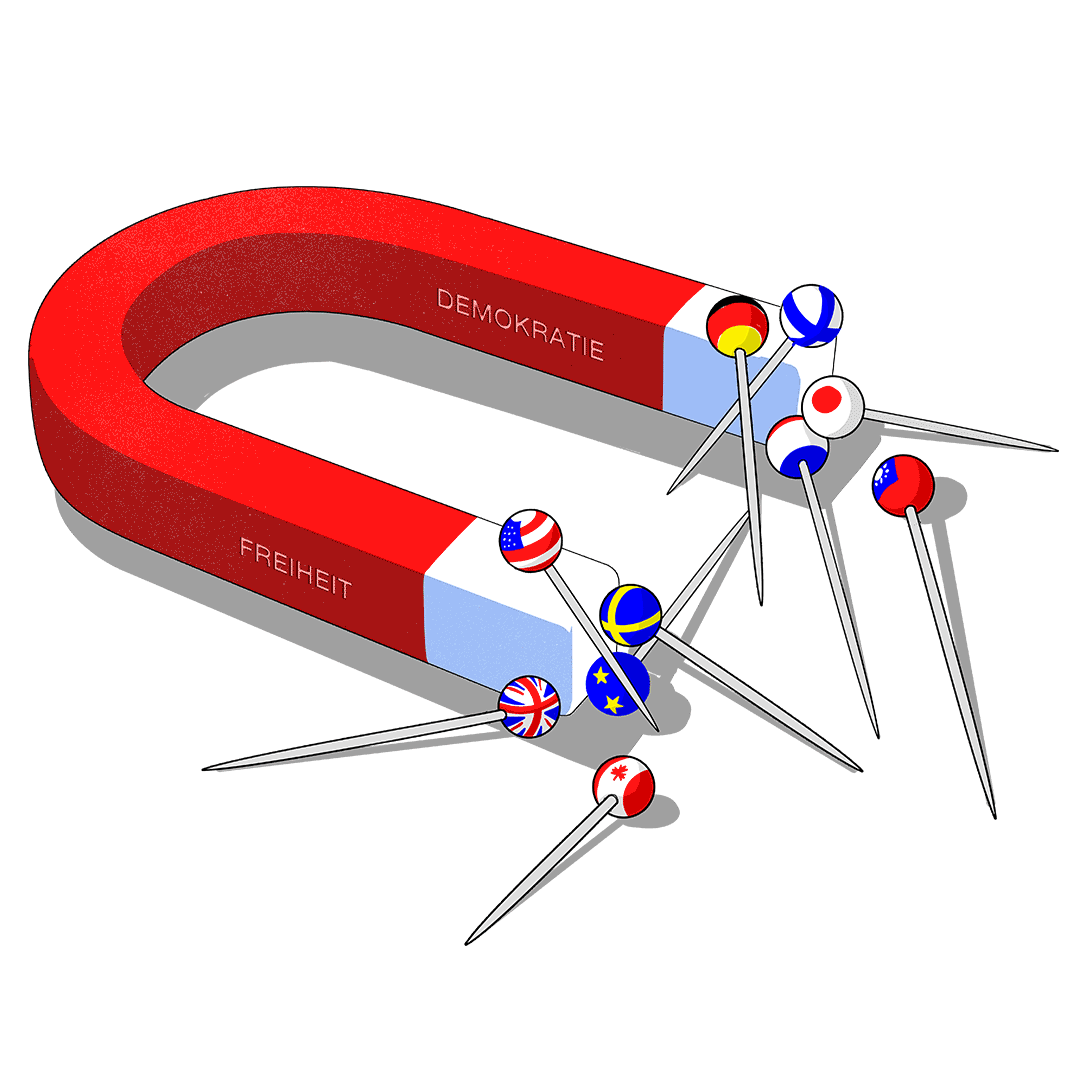THE GREAT REGROUPING OF THE WEST
Powerful attraction
NATO’s enlargement to the East is becoming a reality, only further north than expected – a development the Russian president brought upon himself. The expected accession of Sweden and Finland to the Alliance offers the Nordic countries a wealth of new opportunities.
TEXT: GURI MELBY
ILLUSTRATION: EMMANUEL POLANCO/SEPIA


THE GREAT REGROUPING OF THE WEST
Gewaltige Anziehungskraft
NATO’s enlargement to the East is becoming a reality, only further north than expected – a development the Russian president brought upon himself. The expected accession of Sweden and Finland to the Alliance offers the Nordic countries a wealth of new opportunities.
TEXT: GURI MELBY
ILLUSTRATION: EMMANUEL POLANCO/SEPIA
It's official now – Sweden and Finland have submitted their applications for NATO membership. And Denmark will finally participate in the EU's Common Security and Defence Policy. Even though Turkish President Erdogan is trying to use the NATO accession process to extract a few more concessions from the partners, it seems highly likely that Finland and Sweden will join the Alliance shortly. This opens a Pandora's box of challenges and opportunities, both political and strategic, for NATO in the North.
Norway is one of the three Nordic countries that are already members of NATO. It became a founding member of the Alliance after efforts to create a Nordic, or at least Scandinavian, defence alliance failed in the early stages of the Cold War. Norway was the only NATO ally that directly bordered Russia, and the decision was not without problems.
Today, 73 years later, support for Norwegian NATO membership is greater than ever, and the role as “NATO of the North” has become a topic of conversation for politicians of virtually all political persuasions, with the exception of the extreme left. The socialist left party, Sosialistisk Venstreparti, and Rødt, the red party, have advocated leaving NATO, reviving the idea of a Nordic defence union as an alternative. Ironically, this vision may now actually come to fruition, albeit within the fixed framework of NATO.
It makes perfect sense for smaller countries with similar security threats to integrate their defence forces.
It makes perfect sense for smaller countries with similar security threats to integrate their defence forces.
Joint exercises
Politically, the accession of Sweden and Finland to NATO offers enormous opportunities for Norway and the other Nordic countries. Although Norway is not a member of the EU, and although Sweden and Finland are still not members of NATO, we have always cooperated in the fields of security and defence. Joint Nordic exercises, joint procurement efforts, military exchanges – all these have long been integral parts of Nordic defence cooperation, with some parts working better than others. Sweden and Finland are already strongly integrated with NATO because the Alliance has been a partner. Now, with Sweden and Finland joining the Alliance, the last limitations on Nordic defence cooperation are disappearing.
All five Nordic countries will belong to the same club, and if one of the allies is attacked, all will respond. Gone are the days when it was unclear how NATO would respond to a Russian attack on Finland or Sweden, or how the two countries would react to an attack on the Alliance. That ambiguity has been replaced by a promise. Taken together, the five Nordic countries are a major player in NATO. Each country has a different defence posture, and they complement each other quite well in terms of their capabilities. Finland has large land forces, Sweden and Norway have substantive naval and air forces, Denmark has highly mobile and professional forces. We have a long history of cooperation and share a broad strategic perspective, including the understanding that NATO needs to refocus on collective security and on the Arctic.
Nevertheless, all is not well. The Nordic countries are a large, diverse region with a number of different security challenges. For Norway, the High North and the North Atlantic have always been paramount in this regard. For Sweden and Denmark, security in the Baltic Sea has always been the priority. For Finland, with its 1,340-kilometre land border with Russia, the ability to secure that border is crucial. These different perspectives will not disappear, but new opportunities for cooperation can reduce the differences.
For Norway, the imminent accession of Finland and Sweden to NATO means the focus on Norway's own border with Russia may be replaced by a common Nordic defence concept for the Nordic area in the High North. The accession of Sweden and Finland also opens up new possibilities for strengthening the armed forces beyond the North Atlantic. As soon as all players are NATO members it will be much easier to coordinate the cooperation of Sweden, Finland and Denmark with the Baltic States in the field of Baltic Sea security.
Opening up to deeper Nordic defence cooperation also means better value in defence spending. Possible benefits include sharing training facilities, merging our military training systems, starting work on a common defence of the High North and increased cooperation within NORDEFCO (Nordic Defence Cooperation between Denmark, Finland, Iceland, Norway and Sweden), which can be used as part of NATO's rapid reaction force.
Political priorities
Moreover, as some of our major weapons systems reach the end of their lifecycle, we can begin to create joint capabilities. This holds enormous opportunities, both in terms of interoperability and freeing up resources for other important purposes. But this will take time and political priorities. In twenty or thirty years, every small country will feel the pinch from increasingly expensive and complex weapons systems. Therefore, it makes perfect sense for smaller countries with similar security threats and a high level of mutual trust to integrate their defence forces.
All this will not happen overnight. There will be major cultural, institutional and political hurdles to overcome. In the short term, this kind of integration might even cost us more, as is often the case with reforms. However, without a long-term vision for Nordic defence cooperation, we will remain at the current level, with additional joint projects and training. Strong and visionary political leadership can overcome these hurdles. It is important to have a clear goal in mind and not just a gradual policy of closer technical cooperation.

Guri Melby is leader of the Norwegian liberal party, Venstre. She was Minister of Education and Integration from March 2020 to October 2021.

Guri Melby is leader of the Norwegian liberal party, Venstre. She was Minister of Education and Integration from March 2020 to October 2021.
Also interesting
Theresa Caroline Winter // „Ein Zeichen an die Despoten senden“
Marie-Agnes Strack-Zimmermann, FDP, hat als Vorsitzende des Verteidigungsausschusses offensiv das Zögern der eigenen Koalition bei Waffenlieferungen an die Ukraine kritisiert. Hier fordert sie auch klare Worte in Richtung Teheran und Peking.
Sabine Leutheusser-Schnarrenberger // Kriegsverbrechen verjähren nicht
Zusammen mit Gerhart Baum, Bundesinnenminister a. D., hat Sabine Leutheusser-Schnarrenberger, Bundesjustizministerin a. D., Strafanzeige gegen Wladimir Putin und seine Schergen erstattet. Die russischen Kriegsverbrechen sollen nicht ungesühnt bleiben.
Karl-Heinz Paqué // Die Globalisierung stockt und stottert
Die weltwirtschaftliche Integration steckt in einer Krise. Da muss sie raus – verändert und verbessert. Den Weg dahin kann der marktwirtschaftliche Westen ebnen, auch durch wertebasierte Geopolitik.
